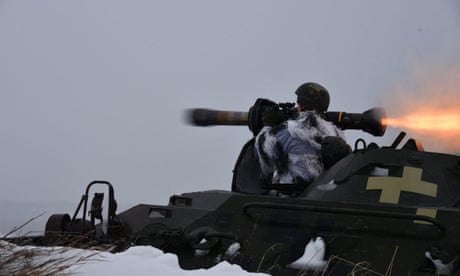- by foxnews
- 08 Apr 2025
How British ‘tank-busters’ are helping Ukraine halt Russian attack
How British ‘tank-busters’ are helping Ukraine halt Russian attack
- by theguardian
- 21 Mar 2022
- in news

It has become a common sight in the first three weeks of the invasion of Ukraine - Russian tanks, transporters and supply trucks burnt out at the side of the road, picked off by lightweight weaponry. While intrepid Ukrainian troops have been deploying the tactics, Britain has played a role in supplying the tech and the knowhow. While Britain's response to the refugee crisis in Ukraine has been heavily criticised, it is now widely acknowledged in the world's defence ministries to have played a leading role in arming Ukrainian troops with the most effective weapons, as well as training.
"We can criticise British foreign policy at times, but we actually led," said Professor Sir Lawrence Freedman, emeritus professor of war studies, King's College London. "There has been very close cooperation with the Ukrainians for a while, so there was a good idea of what they'd need, but it also had a good anti-tank weapon to send them. It was the first to send substantial equipment before war began, and it has made a difference."
Those anti-tank weapon are the NLAWs, or next generation light anti-tank weapons, which have been so effective against Russian vehicles that have been left exposed as a result of a lack of military coordination. Britain's involvement in training troops dates back to Russia's annexation of Crimea in 2014. In the face of some opposition within Whitehall, British military help for Ukraine was conducted through Operation Orbital from 2015.
Ukraine's former president Petro Poroshenko has said that he inherited a decrepit armed forces when he came to power in 2014, which was transformed by western aid. About 22,000 Ukrainian troops have been trained through the programme.
Meanwhile, the NLAWs have been very effective, with some sources reporting an extraordinary 90% hit rate. The weapons, which can be swiftly deployed at close quarters and discarded, are lighter than the similar Javelin anti-tank missile systems, which the US has been dispatching to Ukraine. So far, Britain has sent more than 4,200 NLAWs.
However, while the supply of the weapons and past training from Britain have helped, military experts warn that there simply has not been time to help Ukraine with the more sophisticated training and weapons systems required for countering a full invasion. It has left Britain and others largely restricted to supplying the lightweight defensive weaponry used so far. The government has said it will supply Starstreak anti-aircraft missiles to Ukraine, though even that system requires significant training time.
"Operation Orbital has been very successful - but whether it proves successful enough is a different question," said defence analyst Prof Michael Clarke. "The Russians first of all will bring in bigger numbers. Secondly, all military forces will learn to adapt, so Ukrainians will probably not be finding such easy targets."
Others warn that while Britain gave assistance to Ukraine in the years before the invasion, significant weaknesses remained in Ukrainian capabilities. Nick Reynolds, the research analyst for land warfare at Royal United Services Institute (RUSI), said that remedying those weaknesses or giving Ukrainian troops counter-offensive capabilities was now logistically very hard and risked leading to escalation.
"There are limitations in terms of integrating kits, in whether Ukrainians can use it - and it is equipment we don't want to fall into Russian hands," he said. "At the same time, there's just enormous difficulties in getting people trained up in terms of time. And when you're trying to retain that line where Nato is not directly involved, would you train Ukrainian troops in a Nato country or send trainers into a war zone? If we wanted to help Ukraine in these ways, these are things that needed to happen beforehand, without the timeframe issues and complexities."
- by foxnews
- descember 09, 2016
Ancient settlement reveals remains of 1,800-year-old dog, baffling experts: 'Preserved quite well'
Archaeologists have recently unearthed the remarkably well-preserved remains of a dog from ancient Rome, shedding light on the widespread practice of ritual sacrifice in antiquity.
read more


